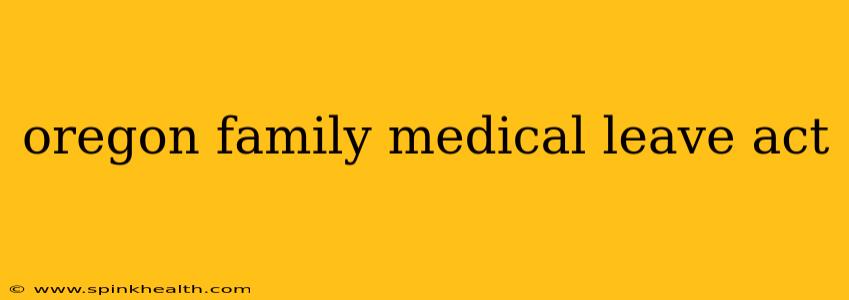The arrival of a new child, a serious illness, or the need to care for a loved one—life's unexpected turns often require us to step away from work. In Oregon, the Family and Medical Leave Act (FMLA) provides crucial protection for employees facing these challenges. But understanding its intricacies can feel like navigating a maze. This guide aims to illuminate the path, offering a clear and comprehensive understanding of Oregon's FMLA, answering common questions and providing valuable insights.
Let's begin our journey by understanding the core principles of Oregon's FMLA. It's designed to balance the needs of employees with the operational requirements of businesses, ensuring a compassionate yet practical approach to leave. The act allows eligible employees to take unpaid, job-protected leave for specific qualifying reasons, offering a lifeline during challenging times.
Who Qualifies for Oregon FMLA?
This is a cornerstone question many employees grapple with. To qualify under Oregon's FMLA, you generally need to meet certain criteria. This often includes working for a covered employer for a specified period, having worked a certain number of hours, and having a qualifying reason for leave. The specific requirements can be nuanced, so it's vital to review the details carefully. Your employer’s human resources department can be a valuable resource in this process.
What are Qualifying Reasons for Leave Under Oregon FMLA?
Oregon's FMLA encompasses a range of qualifying reasons, encompassing both medical and family-related needs. These generally include:
- Serious health condition of the employee: This includes illnesses requiring significant medical attention, potentially involving hospitalization or ongoing treatment.
- Serious health condition of a family member: This extends to caring for a spouse, child, or parent with a serious health condition.
- Birth and bonding with a newborn child: This allows parents to bond with their newborns, crucial for the emotional and physical well-being of both parent and child.
- Adoption or foster care placement of a child: This recognizes the significant adjustments needed when welcoming a child through adoption or foster care.
It's important to note that the definition of "serious health condition" can be complex, often requiring substantiation through medical documentation.
How Much Leave Am I Entitled To Under Oregon's FMLA?
The amount of leave available under Oregon's FMLA varies. It's typically calculated based on a combination of factors, including the employer's size and the employee's tenure. This can often lead to confusion, highlighting the importance of direct communication with your employer's human resources department to clarify your specific entitlement.
What Documentation Do I Need to Provide?
Providing the necessary documentation is crucial for a successful FMLA leave application. This usually involves medical certifications from healthcare providers, substantiating the serious health condition of the employee or family member. Failure to provide the requested documentation can delay or even jeopardize your leave application. Communicate proactively with your employer and healthcare providers to ensure the timely submission of all required documents.
What are My Job Protection Rights Under Oregon FMLA?
One of the key protections offered by Oregon's FMLA is the right to return to your job after your leave concludes. This ensures job security during a challenging time. However, there might be specific conditions, such as the employer's ability to offer your original position or a comparable role. Understanding these conditions is vital for maintaining a positive employment relationship during and after your leave.
Can I Use Oregon's FMLA and Other Leave Simultaneously?
The ability to use Oregon’s FMLA concurrently with other forms of leave, such as vacation time or sick leave, depends on specific circumstances and employer policies. Clarifying this with your HR department is essential to avoid misunderstandings and ensure compliance.
What Happens if My Employer Violates Oregon's FMLA?
If you believe your employer has violated Oregon’s FMLA, understanding your legal recourse is critical. This may involve contacting the Oregon Bureau of Labor and Industries (BOLI) for assistance or exploring legal avenues to address the violation. Seeking legal counsel is recommended to navigate this complex area effectively.
Navigating Oregon's FMLA can be challenging. Remember, clear communication with your employer and careful review of your rights and responsibilities are paramount. This guide provides a foundational understanding; however, it’s always advisable to consult with your employer's HR department or a legal professional for personalized guidance. Your well-being and the well-being of your family are paramount, and understanding your rights under Oregon’s FMLA is the first step toward navigating life's challenges with confidence.

